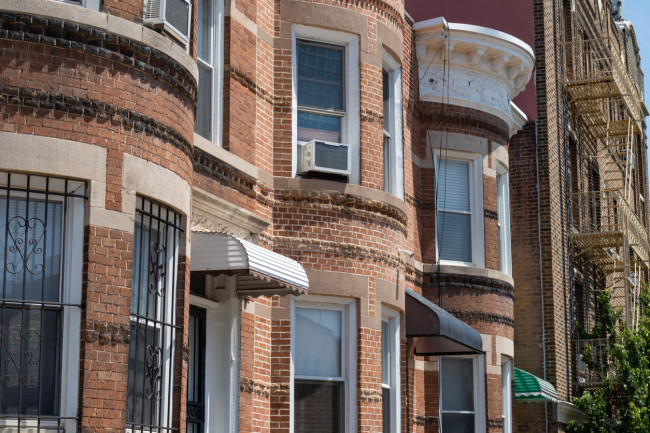6 ways to break your NYC apartment lease

Landlords are struggling to fill apartments and that makes it more complicated to break your lease right now.
iStock
New York City renters increasingly need to break their leases during the pandemic—because of job loss, or wanting to move closer to family in another state. Whatever the reason, breaking a lease isn’t a simple proposition and you need to be aware of certain pitfalls.
For starters, landlords are going to have a tough time filling your vacant apartment, so they are not as inclined as they may have been in the past to let you out of your lease.
According to The Elliman Report for Manhattan, Brooklyn, and Queens for August, the number of rental listings hit the highest total in 14 years last month, jumping 166 percent. Leases with concessions, like a month or two of free rent, reached the largest market share in nearly a decade of tracking. These are signs landlords are struggling to fill units.
Tenant attorneys have been approached by lots of tenants about lease breaks this year. Sam Himmelstein, partner at Himmelstein, McConnell, Gribben, Donoghue & Joseph (and a Brick Underground sponsor) told us back in April the number of tenants leaving NYC was “massive."
And leasing agent Adam Frisch, managing principal at Lee & Associates Residential NYC, says throughout the summer he was getting requests for at least 10 lease breaks a day.
The fact that landlords are offering more concessions can be upsetting to renters who signed leases recently. One tenant (who wanted anonymity) told us she was livid that tenants coming in now are being offered three months free—something she was not offered in April.
Want peace of mind when looking for a sublet / short-term rental? Use Ohana, the largest NYC subleasing community. Ohana verifies both hosts and subtenants and sets up a video call before booking. The rent is only released after you move in and confirm everything is good. Browse listings at liveohana.ai.
“I understand we all had unknowns when it comes to the pandemic, but their priority should also be appeasing the tenants they already have. I’m struggling to figure out how to get help to renegotiate my rate or discuss breaking my lease altogether,” she says.
[Editor's note: An earlier version of this post was published in March 2018. We are presenting it again with updated information for September 2020.]
Last year, landmark rent reforms shifted some responsibility to landlords when it comes to re-renting an apartment after a tenant breaks the lease. Landlords now have what’s called “a duty to mitigate,” meaning they need to do what they can to look for a replacement tenant, but even so, you could still be on the hook for the entirety of the lease, especially as landlords struggle to fill their buildings.
Ultimately, in order to get out of your contract, you need to have some legitimate reason for the landlord to agree to release you or you need to find something the landlord has done to breach the agreement. We’ve rounded up the main exit strategies, as well as how to execute them with a minimum of friction and the smallest blow to your wallet.
1) Find another tenant
If you find another qualified tenant, New York state law requires the landlord to “assign” the lease to the new renter and let you out of your lease responsibilities within 30 days. However, the new tenant does have to be approved by your landlord.
If a landlord decides your candidate isn’t suitable, they can turn them down, provided they give you a valid reason for the refusal, says real estate attorney Steven Wagner, a partner at Wagner Berkow & Brandt (a Brick Underground sponsor). To qualify, a tenant should make 40 times the monthly rent at minimum, have a good credit score, and employment letter and copies of recent pay stubs and bank statements.
Before casting your net for a replacement tenant, figure out how the landlord or management company plans to handle the new lease, especially for renters hoping to stay on longer than a few months. Will they allow the tenant to stay for the rest of your lease term, or require the tenant to sign an entirely new year-long agreement? What will renewal terms be once that initial period is up?
Websites like Leasebreak connect people looking to break their leases with those in search of short-term rentals. You could also approach a rental broker. If you liked the agent who helped you locate the apartment initially, call him or her back and ask for help, or work with a new agent.
If you use a broker, it could relieve you of some headaches. The broker can post your listing to the brokerage's internal database, widening your audience, coordinate all of the apartment showings, screen out anyone who might not be financially qualified to rent in the building, handle your landlord’s requirements and lease-break protocols for you, and serve as a single point of contact to identify a new tenant.
The new tenant is technically on the hook for the broker's fee—which can range from a month’s rent to 15 percent of a year’s rent—but you may find yourself paying the fee, especially if you're desperate to get out quickly.
It’s also possible you might pay the broker in order to remove the commission as an obstacle for anyone looking to rent.
2) Sublet your place
Just as you have the right to assign your lease, you also have the right to sublet your place if your building has at least four apartments.
With a sublet, the assumption is the leaseholder is leaving the apartment for a temporary period. As the leaseholder, you’re still responsible for paying rent to the landlord and any damage to the apartment.
You can find a subletter the same way you’d find a new tenant, by advertising on your social media accounts or on various rental and roommate sites. You could even enlist the help of a broker if you’d like someone else to do the heavy lifting. Once you've found a suitable candidate, you should notify your landlord. If she doesn't respond to your request within 30 days—or within 30 days of receiving any additional information she's asked for—then this is interpreted as legal consent.
3) Ask to be set free
During the pandemic, a request for a lease break may not come as a surprise to your landlord—they’re well aware of the toll New Yorkers have suffered. Most tenant attorneys say communication is key when it comes to breaking your lease.
A landlord might be more likely to work with you if you tell the truth about why you’re moving, although it is obviously easier to re-rent an apartment when demand is high or when it’s closer to the end of your lease.
Some buildings will make you pay an early termination fee—anywhere from a flat rate of $1,000 to three or four months’ rent.
“Send a registered letter to your landlord explaining why you need to break your lease,” advises Gus Waite, principal broker at Station Cities, a brokerage with relocation expertise. “Ask them for any suggestions they might have that would allow you to get out of the lease.”
He recommends getting your landlord to sign a “surrender agreement," which is a standard legal form stating both you and your landlord agree to release each other from the obligations of the lease. It shouldn't be difficult to get since it's in the landlord's best interest to sign. It should identify your name, the landlord, the address, and the dates of the lease.
Unless you’ve used your security deposit as rent—which is something that was specifically allowed by Governor Andrew Cuomo during the current public health crisis—it should be returned to you, minus any repair costs, within 14 days of you vacating the apartment.
4) Swap addresses, not landlords
If you rent from a major landlord who owns multiple properties, you could ask to switch to another apartment in their portfolio. It’s possible some of the bigger management companies will let you break the lease in this case.
Some landlords are also countering requests from tenants to go month to month as a result of the pandemic by offering to add clauses saying you can move out early, without penalty, if you give 30-days notice. This gives you the legal protections of a lease and locks in your rent. With a month-to-month arrangement, the landlord can increase your rent at any time.
5) Annoy your landlord
Although it's one of the less honorable tactics at your disposal, pestering your landlord may convince them it would be easier to find a new tenant than have you stay out the rest of your lease.
“The landlord will want to retaliate, but the landlord’s running a business,” Wagner says. “At the end of the day, they’ll make a decision which favors them economically.”
One of the surest ways to do this is to call 311 and inform the city of (legitimate) violations at your building, whether it’s problems with the facade, mold, vermin or other issues. Some agencies that handle these complaints are the Department of Buildings, the Department of Environmental Protection, and the Department of Housing Preservation and Development. For any existing violations, which will be listed on the DOB or HPD database, a well-timed call to remind the city of the property owner’s lack of attention could help your cause, Wagner says.
The city keeps the identity of people who file complaints confidential, but your landlord won't have a hard time putting two and two together if the complaint concerns your apartment or if you threaten to call the city about a specific issue beforehand. You could also file a so-called HP action, which is a relatively straightforward housing court complaint that effectively gets city inspectors out to your building to look for violations.
Lastly, there’s always the chance that your landlord illegally destabilized your apartment, taking it out of the state’s rent-stabilization program. Start by getting your apartment's rent history from the state Division of Housing and Community Renewal. This can also help you determine whether the current rent is legal.
As with any of these strategies, caution is the name of the game. A landlord could become aggressive, so this approach is not for the faint of heart. (Note that if a landlord does fire back with a lawsuit within six months of you complaining to a government agency, it’s legally considered retaliation under New York state real estate law, and you can win damages in court for it, Wagner says.) Bear in mind court cases ground to a halt in the early days of the pandemic and the process is far from back up and running as normal.
One thing you don’t want to do is to breach provisions of your lease by, say, withholding rent, damaging the apartment, or doing anything illegal in your place to annoy your landlord. Though sometimes a landlord will agree to let you out of your lease to get you to stop, Wagner says, it’s entirely possible he’ll take you to court (when he can) and sue you for damages and legal fees.
6) Force an eviction
Every apartment in New York is required to have a minimum of services guaranteed by the landlord. This is the warranty of habitability—the promise landlords must make to keep your apartment and the building safe and livable at all times. It's an important rule that reassures tenants that their housing is safe and tells landlords what is required of them.
However, if conditions are so bad you are forced to leave, this is called constructive eviction.
A break of the warranty of habitability can result in a rent abatement but constructive eviction would prevent you from using the apartment altogether. What you’re saying is that you’ve technically been evicted because your apartment is uninhabitable.
This is not something to undertake lightly. First you have to move out, and if you don’t prove your claims, you’ll have to pay the rent, Wagner says. So you better start documenting the conditions before packing your boxes.
Call 311 and have building inspectors come out. If they issue violations, that’s objective proof of the problems, Wagner says. You can also take photos, send letters to the landlord, or call in experts to confirm the existence of mold, asbestos, or secondhand smoke. A certified industrial hygienist is your best bet for the testing.
The violations may be enough to convince your landlord to release you, but you may have to take the issue to housing court. This is, again, a major step. Winding up in housing court, even if you initiate the case, is a permanent black mark on your record that can land you on the so-called tenant blacklist which isn’t ideal, even though new laws prohibit landlords from refusing to rent to you if they find out you have had a complicated tenant-landlord relationship in the past.
Previous versions of this article included writing and reporting by Leah Hochbaum Rosner and Leigh Kamping-Carder.
You Might Also Like




























